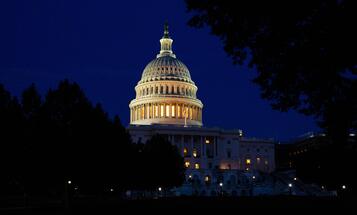
The SCOTUS Case Quietly Threatening Worker Power
It's no coincidence that SCOTUS is choosing a moment when Black and brown workers are building power to threaten labor's gains.

The face of the labor movement is shifting, and 2023 will be another pivotal year for workers. But a case before the Supreme Court, Glacier Northwest Inc. v. International Brotherhood of Teamsters, could directly undermine unions’ ability to strike and overall progress in building worker power.
At issue in Glacier Northwest is a company wanting to bypass 60 years of settled case law in favor of an exemption to existing federal labor law that would allow a corporation to sue unions if their strikes caused intentional property damage. In 2017, unionized workers at concrete company Glacier Northwest Inc. went on strike to protest contract negotiation delays. The company alleged the strike was intentionally timed to damage their concrete, rendering it unusable.
There are exceptions for egregious economic damage, but as established in San Diego Trades Council v. Garmon, the company can’t go directly to the courts to sue for damages. The National Labor Relations Board (NLRB) determines if a particular strike is an exception; if it is, then and only then can the company sue.
If the Court makes this exemption allowing Glacier Northwest to bypass the NLRB, workers could lose a critical weapon in the fight against corporations: the ability to withhold their labor. It also could trigger a wave of lawsuits against striking workers based on claims of property damage. A pro-corporate outcome in Glacier Northwest would limit a necessary check on corporate power and curb the NLRB’s authority. Such actions could in turn embolden conservative state legislatures to pass laws controlling how unions conduct strikes, thus undermining unions as democratic institutions.
It's hardly coincidental that the ultra-conservative SCOTUS is choosing a moment when Black and brown workers are building power to usurp the NLRB in order to undermine this fundamental right. In 2023, 150 contracts representing nearly 1.6 million workers will expire. The workers will enter bargaining with momentum from a powerful, necessary resurgence of organizing led by Black and brown workers traditionally sidelined in the labor movement. This includes workers at Starbucks and Amazon and at multiple airports, fast food, and media companies who led successful union drives, work stoppages, and other collective actions. Waves of organizing in industries dominated by people of color are likely to lead to more innovative and equitable contracts. But workers can’t win equitable contracts if corporations convince the Supreme Court to claw back hard-fought protections.
Against this dangerous legal backdrop, organizers continue to lead the way to building a powerful labor movement, but it can continue only if the government steps up to affirmatively protect organizing.
Organizers continue to lead the way to building a powerful labor movement, but it can continue only if the government steps up to affirmatively protect organizing.
Congress must finally pass the PRO Act, which would ban anti-worker “right to work laws,” enforce penalties against employers who punish workers for organizing, stop companies from replacing striking workers, and crack down on misclassification of independent contractors, among other critical protections.
The Federal Trade Commission recently proposed a ban on non-compete clauses a practice that suppresses wages and wage growth, prevents workers from switching jobs, and limits entrepreneurship, all disproportionately impacting people of color. It’s an important step, but as always, the proof is in the implementation. We’ll continue to advocate for equitable enforcement. Ballot initiatives that enshrine the right to collective bargaining, like the Collective Bargaining Freedom Act in Illinois, are another option for state level action. The last two years have seen critical gains for worker power, especially for Black and brown workers. We remain committed to protecting those wins and to expanding them.




